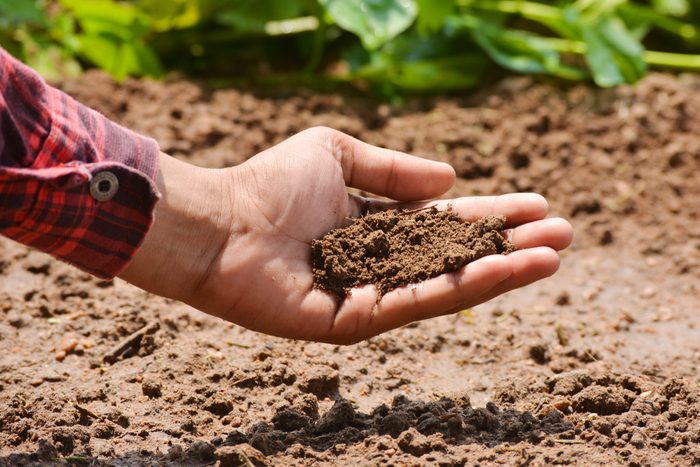How To Test Soil pH With and Without a Kit

From formal lab tests to DIY baking soda and vinegar, here's how to choose which method is best for your garden, lawn and budget.
Our editors and experts handpick every product we feature. We may earn a commission from your purchases.
When I started gardening, I assumed you could put seeds in dirt, add water and watch them grow into plants. That uneducated approach produced haphazard results and few vegetables. Somehow, I missed the memo about testing for pH.
“Soil pH testing is vital for understanding your soil’s chemical makeup and how it affects plant growth,” says Greg Niewold of PowerPlanter.com. “Maintaining a neutral pH level is optimal for microbial activity and nutrient absorption by plant roots. Soil with a very high or very low pH may result in nutrient deficiency or toxicity.”
Because of this, testing your soil’s pH is the first step toward preparing your future garden. And while most plants prefer a pH of 5.5 to 7.5 (7.0 is considered neutral), it’s also good to remember there’s more to soil than dirt.
“It’s not just soil pH or nutrient levels that make a difference, but rather a complete balance of what Mother Nature intended,” says Kathy Glassey, director of renewable services for Monster Tree Service. “A diverse biological population does a great job of making nutrients available to the plant in a form that plants prefer.”
On This Page
How To Test Soil pH With a Kit
You can test your soil’s pH with a home test kit, or send a sample to your local university extension office or an independent lab. Most home test kits offer instant readings, whereas lab tests can a few weeks, and they cost more.
“However, lab tests are the most accurate and provide very detailed information,” says Glassey. “For example, if you send in a soil test for an oak tree, they will make recommendations based on optimal needs for an oak tree.”
Most pH test kits are simple to use, with easy-to-follow instructions. Generally, the steps involve mixing a soil sample with a testing solution, waiting for the reaction, then comparing the results to a chart. Depending on the type of kit, there may be other steps involved.
“Soil pH testing kits for use by the homeowner can be very fast and inexpensive,” Glassey says. “However there are some things to know.”
Among them:
- Use distilled water. Tap water can skew your results.
- Follow the directions that come with the test kit precisely for a complete representation of your soil.
- Consider buying a soil pH meter, which lets you probe numerous areas and reveals if your soil is too compact.
How To Test Soil pH Without a Test Kit
Here are two DIY solutions for testing soil pH without a kit.
The pantry soil pH test
Place two tablespoons of soil in a bowl and moisten with distilled water. Add one-half cup baking soda. If the mixture fizzes, the dirt is acidic. On the other hand, if you add one-half cup vinegar to two tablespoons soil and the mixture fizzes, the ground is alkaline. If neither test elicits a reaction, that indicates a neutral pH.
Worm method
Plentiful earthworms reflect well on your soil. “If the ground has earthworms, it will likely have beneficial microbes for healthy soil and flourishing plants,” says Niewold.
To do a worm test, dig a hole one foot across and equally deep in somewhat moist soil that’s at least 55 degrees. Sift through the ground with your hands and count the earthworms. “If you find at least ten worms, the soil is in good shape,” Niewold says. “Less than that may indicate a lack of organic matter, or soil that is too acidic or alkaline.”
Are Soil pH Tests Accurate?
Yes, but they don’t always show the full picture. For more insight, test the microbial biomass of your soil, because fertilizers and other nutrients you apply are only effective if they break down into a useable form for plants.
“That process is largely determined by the chemistry that must be broken down before the plant can utilize it,” says Glassey. “Biological diversity helps to make this cycle extremely effective but also allows for less synthetic product usage.”
Cost of pH Test Kits
It typically varies from $10 to $50, with most lab tests in the $30 to $50 range. It might cost more if you’re researching complex soil issues like salt content or metals.
“The vinegar and baking soda method is the cheapest option for those who want to test their soil pH on a budget,” says Niewold. “However, it is also the least specific.
“If you’re willing to spend more money, a test strip kit can give you a more definitive result. A laboratory test is a way to go for the most precise information about your soil, but it’s also the most expensive option.”



